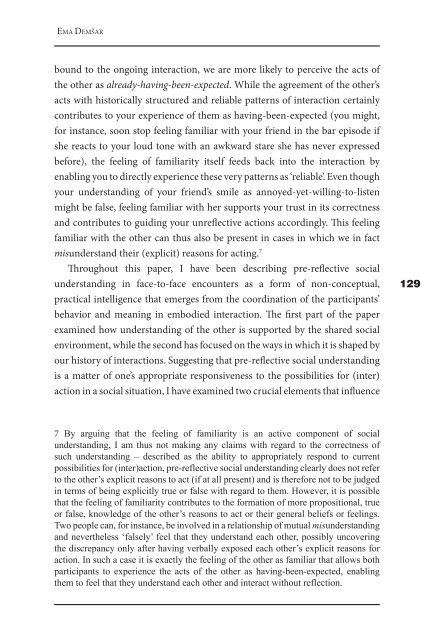phainomena
PHAINOMENA-98-99_e-verzija
PHAINOMENA-98-99_e-verzija
You also want an ePaper? Increase the reach of your titles
YUMPU automatically turns print PDFs into web optimized ePapers that Google loves.
EMA DEMŠAR<br />
bound to the ongoing interaction, we are more likely to perceive the acts of<br />
the other as already-having-been-expected. While the agreement of the other’s<br />
acts with historically structured and reliable patterns of interaction certainly<br />
contributes to your experience of them as having-been-expected (you might,<br />
for instance, soon stop feeling familiar with your friend in the bar episode if<br />
she reacts to your loud tone with an awkward stare she has never expressed<br />
before), the feeling of familiarity itself feeds back into the interaction by<br />
enabling you to directly experience these very patterns as ‘reliable’. Even though<br />
your understanding of your friend’s smile as annoyed-yet-willing-to-listen<br />
might be false, feeling familiar with her supports your trust in its correctness<br />
and contributes to guiding your unreflective actions accordingly. This feeling<br />
familiar with the other can thus also be present in cases in which we in fact<br />
misunderstand their (explicit) reasons for acting. 7<br />
Throughout this paper, I have been describing pre-reflective social<br />
understanding in face-to-face encounters as a form of non-conceptual,<br />
practical intelligence that emerges from the coordination of the participants’<br />
behavior and meaning in embodied interaction. The first part of the paper<br />
examined how understanding of the other is supported by the shared social<br />
environment, while the second has focused on the ways in which it is shaped by<br />
our history of interactions. Suggesting that pre-reflective social understanding<br />
is a matter of one’s appropriate responsiveness to the possibilities for (inter)<br />
action in a social situation, I have examined two crucial elements that influence<br />
129<br />
7 By arguing that the feeling of familiarity is an active component of social<br />
understanding, I am thus not making any claims with regard to the correctness of<br />
such understanding – described as the ability to appropriately respond to current<br />
possibilities for (inter)action, pre-reflective social understanding clearly does not refer<br />
to the other’s explicit reasons to act (if at all present) and is therefore not to be judged<br />
in terms of being explicitly true or false with regard to them. However, it is possible<br />
that the feeling of familiarity contributes to the formation of more propositional, true<br />
or false, knowledge of the other’s reasons to act or their general beliefs or feelings.<br />
Two people can, for instance, be involved in a relationship of mutual misunderstanding<br />
and nevertheless ‘falsely’ feel that they understand each other, possibly uncovering<br />
the discrepancy only after having verbally exposed each other’s explicit reasons for<br />
action. In such a case it is exactly the feeling of the other as familiar that allows both<br />
participants to experience the acts of the other as having-been-expected, enabling<br />
them to feel that they understand each other and interact without reflection.


